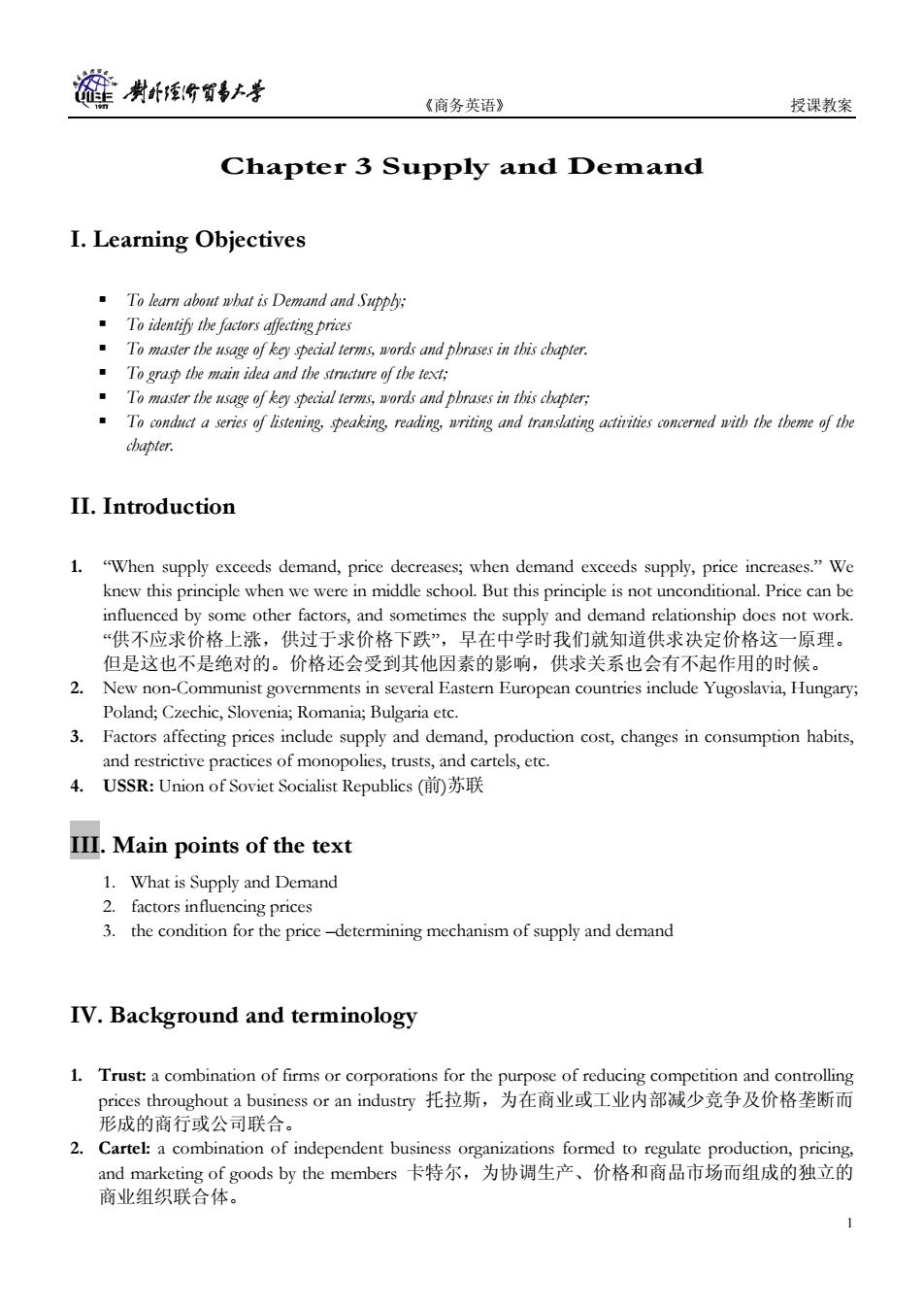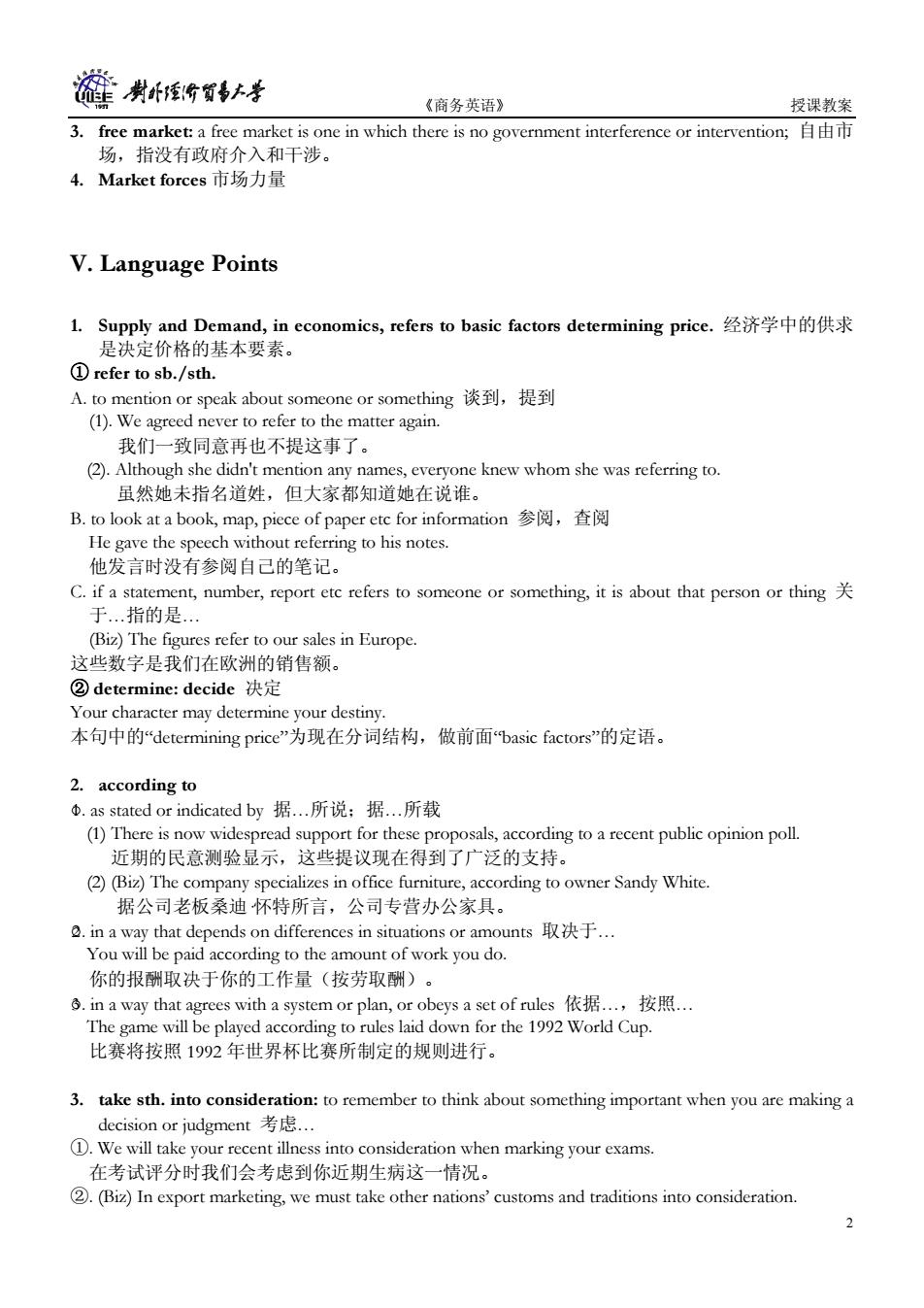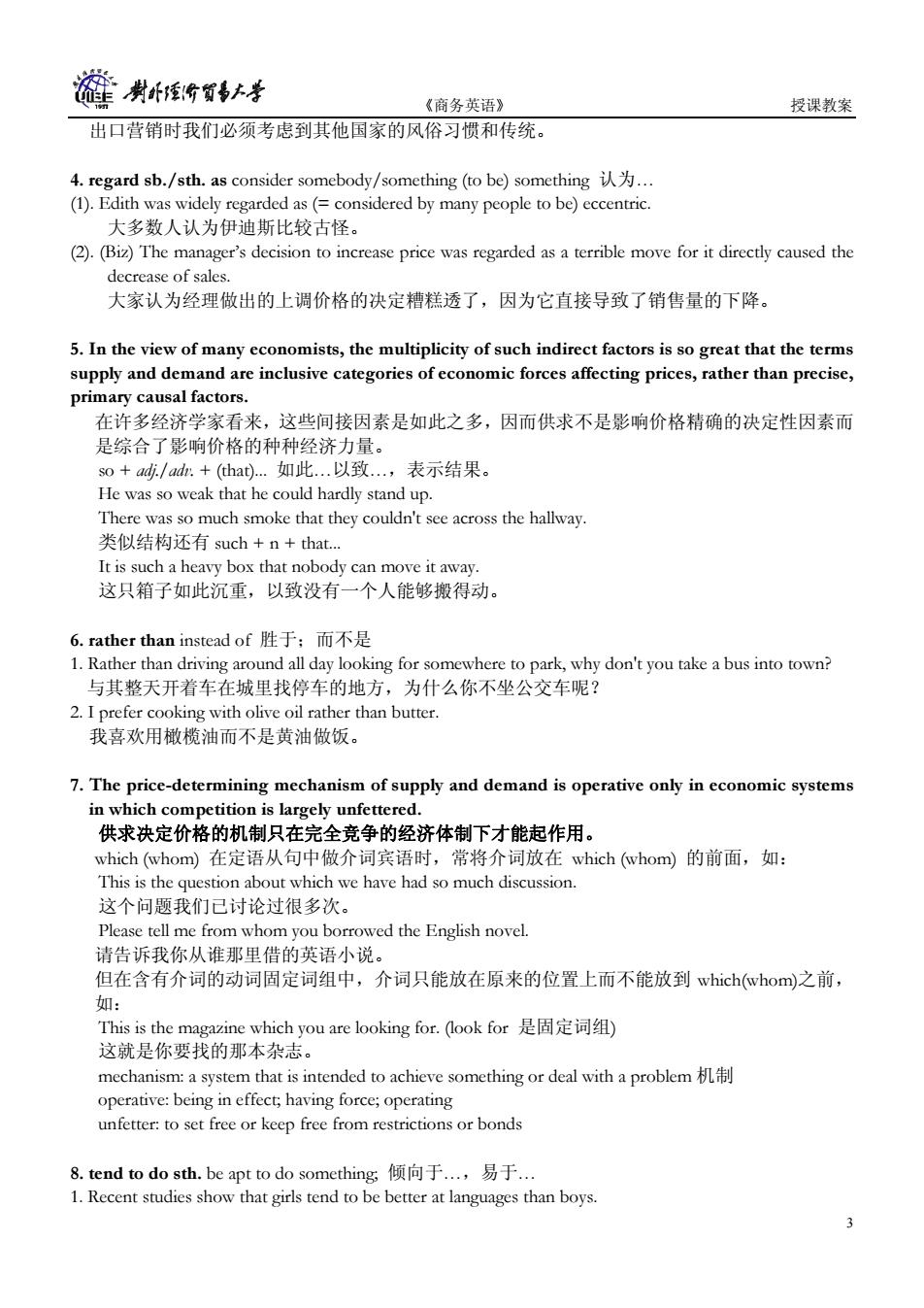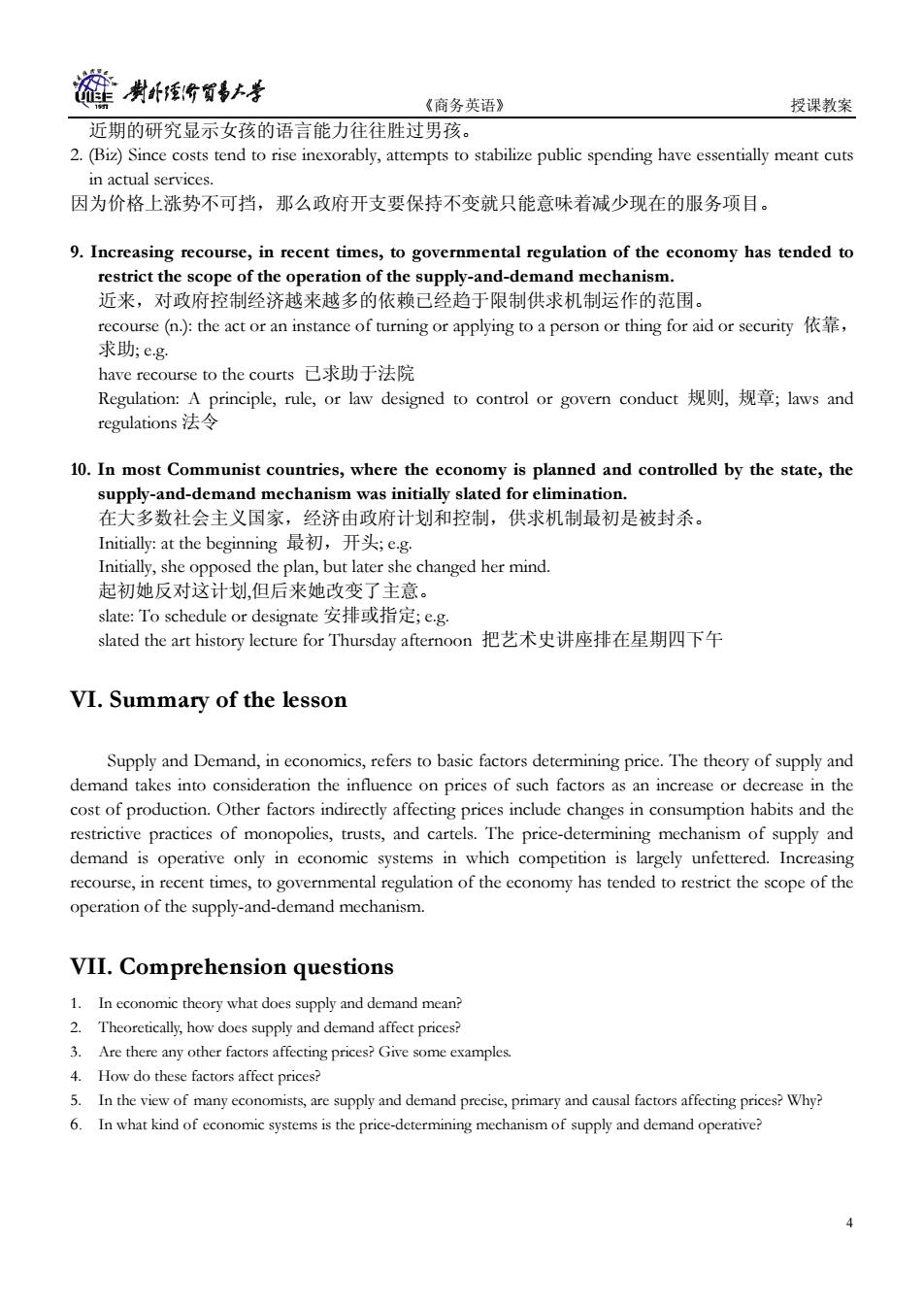
莲肉纤经黄大学 《商务英语》 授课教案 Chapter 3 Supply and Demand I.Learning Objectives To learn about what is Demand and Supply; To identify the factors affecting prices To master the usage of key special terms,words and phrases in this chapter. To grasp the main idea and the structure of the text; To master the usage of key special terms,words and phrases in this chapter; To conduct a series of listening,speaking,reading,writing and translating activities concerned with the theme of the chapter. II.Introduction 1."When supply exceeds demand,price decreases;when demand exceeds supply,price increases."We knew this principle when we were in middle school.But this principle is not unconditional.Price can be influenced by some other factors,and sometimes the supply and demand relationship does not work. “供不应求价格上涨,供过于求价格下跌”,早在中学时我们就知道供求决定价格这一原理。 但是这也不是绝对的。价格还会受到其他因素的影响,供求关系也会有不起作用的时候。 2.New non-Communist governments in several Eastern European countries include Yugoslavia,Hungary; Poland;Czechic,Slovenia;Romania;Bulgaria etc. 3.Factors affecting prices include supply and demand,production cost,changes in consumption habits, and restrictive practices of monopolies,trusts,and cartels,etc. 4.USSR:Union of Soviet Socialist Republics(前)苏联 III.Main points of the text 1.What is Supply and Demand 2.factors influencing prices 3.the condition for the price-determining mechanism of supply and demand IV.Background and terminology 1.Trust:a combination of firms or corporations for the purpose of reducing competition and controlling prices throughout a business or an industry托拉斯,为在商业或工业内部减少竞争及价格垄断而 形成的商行或公司联合。 2.Cartel:a combination of independent business organizations formed to regulate production,pricing, and marketing of goods by the members卡特尔,为协调生产、价格和商品市场而组成的独立的 商业组织联合体
《商务英语》 授课教案 1 Chapter 3 Supply and Demand I. Learning Objectives To learn about what is Demand and Supply; To identify the factors affecting prices To master the usage of key special terms, words and phrases in this chapter. To grasp the main idea and the structure of the text; To master the usage of key special terms, words and phrases in this chapter; To conduct a series of listening, speaking, reading, writing and translating activities concerned with the theme of the chapter. II. Introduction 1. “When supply exceeds demand, price decreases; when demand exceeds supply, price increases.” We knew this principle when we were in middle school. But this principle is not unconditional. Price can be influenced by some other factors, and sometimes the supply and demand relationship does not work. “供不应求价格上涨,供过于求价格下跌”,早在中学时我们就知道供求决定价格这一原理。 但是这也不是绝对的。价格还会受到其他因素的影响,供求关系也会有不起作用的时候。 2. New non-Communist governments in several Eastern European countries include Yugoslavia, Hungary; Poland; Czechic, Slovenia; Romania; Bulgaria etc. 3. Factors affecting prices include supply and demand, production cost, changes in consumption habits, and restrictive practices of monopolies, trusts, and cartels, etc. 4. USSR: Union of Soviet Socialist Republics (前)苏联 III. Main points of the text 1. What is Supply and Demand 2. factors influencing prices 3. the condition for the price –determining mechanism of supply and demand IV. Background and terminology 1. Trust: a combination of firms or corporations for the purpose of reducing competition and controlling prices throughout a business or an industry 托拉斯,为在商业或工业内部减少竞争及价格垄断而 形成的商行或公司联合。 2. Cartel: a combination of independent business organizations formed to regulate production, pricing, and marketing of goods by the members 卡特尔,为协调生产、价格和商品市场而组成的独立的 商业组织联合体

岗仟经所蜀多大学 《商务英语》 授课教案 3.free market:a free market is one in which there is no government interference or intervention; 场,指没有政府介入和干涉。 4. Market forces市场力量 V.Language Points 1.Supply and Demand,.in economics,.refers to basic factors determining price.经济学中的供求 是决定价格的基本要素。 ①refer to sb./sth. A.to mention or speak about someone or something谈到,提到 (1).We agreed never to refer to the matter again. 我们一致同意再也不提这事了。 (2).Although she didn't mention any names,everyone knew whom she was referring to. 虽然她未指名道姓,但大家都知道她在说谁。 B.to look at a book,map,piece of paper etc for information参阅,查阅 He gave the speech without referring to his notes. 他发言时没有参阅自己的笔记。 C.if a statement,number,report etc refers to someone or something,it is about that person or thing 于.指的是. (Biz)The figures refer to our sales in Europe 这些数字是我们在欧洲的销售额。 ②determine:decide决定 Your character may determine your destiny. 本句中的“determining price'”为现在分词结构,做前面basic factors'的定语。 2.according to Φ.as stated or indicated by据..所说;据..所载 (1)There is now widespread support for these proposals,according to a recent public opinion poll. 近期的民意测验显示,这些提议现在得到了广泛的支持。 (2)(Biz)The company specializes in office furniture,according to owner Sandy White. 据公司老板桑迪怀特所言,公司专营办公家具。 ②.in a way that depends on differences in situations or amounts取决于.. You will be paid according to the amount of work you do. 你的报酬取决于你的工作量(按劳取酬)。 .in a way that agrees with a system or plan,.or obeys a set of rules依据.,按照.. The game will be played according to rules laid down for the 1992 World Cup. 比赛将按照1992年世界杯比赛所制定的规则进行。 3.take sth.into consideration:to remember to think about something important when you are making a decision or judgment考虑.. D.We will take your recent illness into consideration when marking your exams. 在考试评分时我们会考虑到你近期生病这一情况。 2.(Biz)In export marketing,we must take other nations'customs and traditions into consideration. 2
《商务英语》 授课教案 2 3. free market: a free market is one in which there is no government interference or intervention; 自由市 场,指没有政府介入和干涉。 4. Market forces 市场力量 V. Language Points 1. Supply and Demand, in economics, refers to basic factors determining price. 经济学中的供求 是决定价格的基本要素。 ① refer to sb./sth. A. to mention or speak about someone or something 谈到,提到 (1). We agreed never to refer to the matter again. 我们一致同意再也不提这事了。 (2). Although she didn't mention any names, everyone knew whom she was referring to. 虽然她未指名道姓,但大家都知道她在说谁。 B. to look at a book, map, piece of paper etc for information 参阅,查阅 He gave the speech without referring to his notes. 他发言时没有参阅自己的笔记。 C. if a statement, number, report etc refers to someone or something, it is about that person or thing 关 于…指的是… (Biz) The figures refer to our sales in Europe. 这些数字是我们在欧洲的销售额。 ② determine: decide 决定 Your character may determine your destiny. 本句中的“determining price”为现在分词结构,做前面“basic factors”的定语。 2. according to ○1. as stated or indicated by 据…所说;据…所载 (1) There is now widespread support for these proposals, according to a recent public opinion poll. 近期的民意测验显示,这些提议现在得到了广泛的支持。 (2) (Biz) The company specializes in office furniture, according to owner Sandy White. 据公司老板桑迪·怀特所言,公司专营办公家具。 ○2. in a way that depends on differences in situations or amounts 取决于… You will be paid according to the amount of work you do. 你的报酬取决于你的工作量(按劳取酬)。 ○3. in a way that agrees with a system or plan, or obeys a set of rules 依据…,按照… The game will be played according to rules laid down for the 1992 World Cup. 比赛将按照 1992 年世界杯比赛所制定的规则进行。 3. take sth. into consideration: to remember to think about something important when you are making a decision or judgment 考虑… ①. We will take your recent illness into consideration when marking your exams. 在考试评分时我们会考虑到你近期生病这一情况。 ②. (Biz) In export marketing, we must take other nations’ customs and traditions into consideration

裤尉黄学 《商务英语》 授课教案 出口营销时我们必须考虑到其他国家的风俗习惯和传统。 4.regard sb./sth.as consider somebody/something (to be)something... (1).Edith was widely regarded as(=considered by many people to be)eccentric. 大多数人认为伊迪斯比较古怪。 (2).(Biz)The manager's decision to increase price was regarded as a terrible move for it directly caused the decrease of sales. 大家认为经理做出的上调价格的决定糟糕透了,因为它直接导致了销售量的下降。 5.In the view of many economists,the multiplicity of such indirect factors is so great that the terms supply and demand are inclusive categories of economic forces affecting prices,rather than precise, primary causal factors. 在许多经济学家看来,这些间接因素是如此之多,因而供求不是影响价格精确的决定性因素而 是综合了影响价格的种种经济力量。 so+a./ad.+(ha)…如此..以致..,表示结果。 He was so weak that he could hardly stand up. There was so much smoke that they couldn't see across the hallway. 类似结构还有such+n+that… It is such a heavy box that nobody can move it away. 这只箱子如此沉重,以致没有一个人能够搬得动。 6.rather than instead of胜于;而不是 1.Rather than driving around all day looking for somewhere to park,why don't you take a bus into town? 与其整天开着车在城里找停车的地方,为什么你不坐公交车呢? 2.I prefer cooking with olive oil rather than butter. 我喜欢用橄榄油而不是黄油做饭。 7.The price-determining mechanism of supply and demand is operative only in economic systems in which competition is largely unfettered. 供求决定价格的机制只在完全竞争的经济体制下才能起作用。 which(whom)在定语从句中做介词宾语时,常将介词放在which (whom)的前面,如: This is the question about which we have had so much discussion. 这个问题我们已讨论过很多次。 Please tell me from whom you borrowed the English novel. 请告诉我你从谁那里借的英语小说。 但在含有介词的动词固定词组中,介词只能放在原来的位置上而不能放到which(whom)之前, 如: This is the magazine which you are looking for..(look for是固定词组) 这就是你要找的那本杂志。 mechanism:a system that is intended to achieve something or deal with a problem operative:being in effect;having force;operating unfetter:to set free or keep free from restrictions or bonds 8.tend to do sth.be apt to do something;倾向于.,易于. 1.Recent studies show that girls tend to be better at languages than boys. 3
《商务英语》 授课教案 3 出口营销时我们必须考虑到其他国家的风俗习惯和传统。 4. regard sb./sth. as consider somebody/something (to be) something 认为… (1). Edith was widely regarded as (= considered by many people to be) eccentric. 大多数人认为伊迪斯比较古怪。 (2). (Biz) The manager’s decision to increase price was regarded as a terrible move for it directly caused the decrease of sales. 大家认为经理做出的上调价格的决定糟糕透了,因为它直接导致了销售量的下降。 5. In the view of many economists, the multiplicity of such indirect factors is so great that the terms supply and demand are inclusive categories of economic forces affecting prices, rather than precise, primary causal factors. 在许多经济学家看来,这些间接因素是如此之多,因而供求不是影响价格精确的决定性因素而 是综合了影响价格的种种经济力量。 so + adj./adv. + (that)... 如此…以致…,表示结果。 He was so weak that he could hardly stand up. There was so much smoke that they couldn't see across the hallway. 类似结构还有 such + n + that... It is such a heavy box that nobody can move it away. 这只箱子如此沉重,以致没有一个人能够搬得动。 6. rather than instead of 胜于;而不是 1. Rather than driving around all day looking for somewhere to park, why don't you take a bus into town? 与其整天开着车在城里找停车的地方,为什么你不坐公交车呢? 2. I prefer cooking with olive oil rather than butter. 我喜欢用橄榄油而不是黄油做饭。 7. The price-determining mechanism of supply and demand is operative only in economic systems in which competition is largely unfettered. 供求决定价格的机制只在完全竞争的经济体制下才能起作用。 which (whom) 在定语从句中做介词宾语时,常将介词放在 which (whom) 的前面,如: This is the question about which we have had so much discussion. 这个问题我们已讨论过很多次。 Please tell me from whom you borrowed the English novel. 请告诉我你从谁那里借的英语小说。 但在含有介词的动词固定词组中,介词只能放在原来的位置上而不能放到 which(whom)之前, 如: This is the magazine which you are looking for. (look for 是固定词组) 这就是你要找的那本杂志。 mechanism: a system that is intended to achieve something or deal with a problem 机制 operative: being in effect; having force; operating unfetter: to set free or keep free from restrictions or bonds 8. tend to do sth. be apt to do something; 倾向于…,易于… 1. Recent studies show that girls tend to be better at languages than boys

裤手 《商务英语》 授课教案 近期的研究显示女孩的语言能力往往胜过男孩。 2.(Biz)Since costs tend to rise inexorably,attempts to stabilize public spending have essentially meant cuts in actual services. 因为价格上涨势不可挡,那么政府开支要保持不变就只能意味着减少现在的服务项目。 9.Increasing recourse,in recent times,to governmental regulation of the economy has tended to restrict the scope of the operation of the supply-and-demand mechanism. 近来,对政府控制经济越来越多的依赖已经趋于限制供求机制运作的范围。 recourse (n.):the act or an instance of turning or applying to a person or thing for aid or security, 求助;eg have recourse to the courts已求助于法院 Regulation:A principle,rule,or law designed to control or govern conduct规则,规章;laws and regulations法令 10.In most Communist countries,where the economy is planned and controlled by the state,the supply-and-demand mechanism was initially slated for elimination. 在大多数社会主义国家,经济由政府计划和控制,供求机制最初是被封杀。 Initially:at the beginning最初,开头;e.g Initially,she opposed the plan,but later she changed her mind. 起初她反对这计划,但后来她改变了主意。 sate:To schedule or designate安排或指定;e-g slated the art history lecture for Thursday afternoon把艺术史讲座排在星期四下午 VI.Summary of the lesson Supply and Demand,in economics,refers to basic factors determining price.The theory of supply and demand takes into consideration the influence on prices of such factors as an increase or decrease in the cost of production.Other factors indirectly affecting prices include changes in consumption habits and the restrictive practices of monopolies,trusts,and cartels.The price-determining mechanism of supply and demand is operative only in economic systems in which competition is largely unfettered.Increasing recourse,in recent times,to governmental regulation of the economy has tended to restrict the scope of the operation of the supply-and-demand mechanism. VII.Comprehension questions 1.In economic theory what does supply and demand mean? 2.Theoretically,how does supply and demand affect prices? 3.Are there any other factors affecting prices?Give some examples. 4.How do these factors affect prices? 5.In the view of many economists,are supply and demand precise,primary and causal factors affecting prices?Why? 6.In what kind of economic systems is the price-determining mechanism of supply and demand operative? 4
《商务英语》 授课教案 4 近期的研究显示女孩的语言能力往往胜过男孩。 2. (Biz) Since costs tend to rise inexorably, attempts to stabilize public spending have essentially meant cuts in actual services. 因为价格上涨势不可挡,那么政府开支要保持不变就只能意味着减少现在的服务项目。 9. Increasing recourse, in recent times, to governmental regulation of the economy has tended to restrict the scope of the operation of the supply-and-demand mechanism. 近来,对政府控制经济越来越多的依赖已经趋于限制供求机制运作的范围。 recourse (n.): the act or an instance of turning or applying to a person or thing for aid or security 依靠, 求助; e.g. have recourse to the courts 已求助于法院 Regulation: A principle, rule, or law designed to control or govern conduct 规则, 规章; laws and regulations 法令 10. In most Communist countries, where the economy is planned and controlled by the state, the supply-and-demand mechanism was initially slated for elimination. 在大多数社会主义国家,经济由政府计划和控制,供求机制最初是被封杀。 Initially: at the beginning 最初,开头; e.g. Initially, she opposed the plan, but later she changed her mind. 起初她反对这计划,但后来她改变了主意。 slate: To schedule or designate 安排或指定; e.g. slated the art history lecture for Thursday afternoon 把艺术史讲座排在星期四下午 VI. Summary of the lesson Supply and Demand, in economics, refers to basic factors determining price. The theory of supply and demand takes into consideration the influence on prices of such factors as an increase or decrease in the cost of production. Other factors indirectly affecting prices include changes in consumption habits and the restrictive practices of monopolies, trusts, and cartels. The price-determining mechanism of supply and demand is operative only in economic systems in which competition is largely unfettered. Increasing recourse, in recent times, to governmental regulation of the economy has tended to restrict the scope of the operation of the supply-and-demand mechanism. VII. Comprehension questions 1. In economic theory what does supply and demand mean? 2. Theoretically, how does supply and demand affect prices? 3. Are there any other factors affecting prices? Give some examples. 4. How do these factors affect prices? 5. In the view of many economists, are supply and demand precise, primary and causal factors affecting prices? Why? 6. In what kind of economic systems is the price-determining mechanism of supply and demand operative?